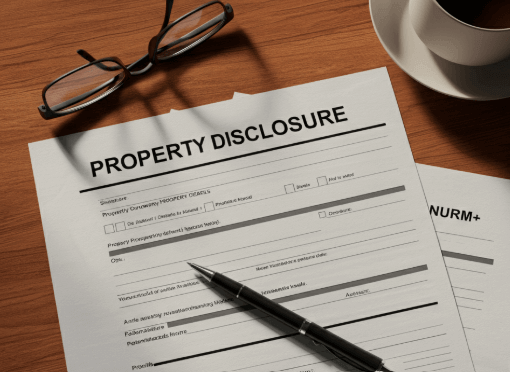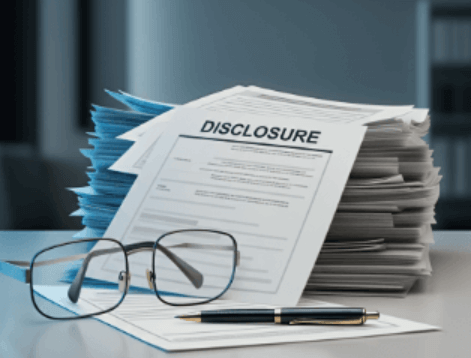What is The Florida Homeowner Disclosure Law? The Florida Homeowner Disclosure Law requires sellers to inform buyers about any property defects or problems that could materially affect its value. Mastering the legal landscape of Florida’s real estate market, including the Florida Homeowner Disclosure Law, is necessary for any serious buyer. This key regulation is a game-changer in property transactions, ensuring buyers have a comprehensive understanding of their potential new homes before making a purchase.
Grasping the intricacies of the Florida Homeowner Disclosure Law can significantly influence the buying process, providing prospective homeowners with a crucial layer of protection and peace of mind. In this blog, we’ll delve into the details of this law, shedding light on its content, significance in the real estate market, and impact on both buyers and sellers in Florida.
Real estate investors Steve Daria and Joleigh have underscored the importance of the Florida Homeowner Disclosure Law in safeguarding their investments in the bustling market. Their experiences highlight how this law is critical in making informed decisions and avoiding unforeseen issues with property acquisitions.
Understanding the Purpose of The Florida Homeowner Disclosure Law
Homeowner disclosure laws aim to protect homebuyers by ensuring they have adequate information about a property before purchasing it.
These laws require sellers to discuss any known defects or issues with the property that could alter its value or threaten the buyer’s safety.
This transparency allows the buyer to make an informed decision and protects the seller from potential legal action based on nondisclosure.

In Florida, the Homeowner Disclosure Law is comprehensive, covering various issues that sellers must disclose.
However, these laws have nuances that every homeowner and potential buyer must understand.
What Must Be Disclosed under Florida’s Law?
- Structural Defects: Any structural issues with the property, such as a damaged foundation, roof, or walls, must be disclosed. These can significantly impact the safety and value of the home.
- Environmental Concerns: This information must be shared with the buyer if the property is in an area with known ecological hazards, such as flood zones or radon exposure areas.
- Plumbing and Electrical Systems: Sellers must disclose any known problems with the plumbing and electrical systems, as these are crucial to the operation and safety of the home.
- Building Code Violations: If the property is not up to code or there were past violations, the seller must inform the buyer.
- Pest Issues: Any current or past infestations of pests, such as termites, must be disclosed, along with the steps taken to fix the issue.
Get An Offer Today, Sell In A Matter Of Days…
The Seller’s Responsibilities and Consequences of Nondisclosure
The obligation to disclose falls squarely on the shoulders of the seller, who must complete a comprehensive disclosure form highlighting any known issues.
This form typically includes questions about various home components and asks the seller to note any problems.
The Importance of Full Disclosure
Sellers must be forthright in their disclosures, as failure to provide precise information can lead to severe consequences.
If a buyer discovers an issue after the purchase that the seller knew about but did not disclose, they may have grounds for legal action.
Sellers can be held liable for the cost of repairs or other damages that result from nondisclosure.
Potential Red Flags for Buyers
Buyers should carefully review the seller’s disclosure before finalizing the purchase.
When in doubt, it’s always wise to conduct a professional home inspection to check potential issues that must be adequately disclosed.
Navigating the Florida Homeowner Disclosure Law as a Homebuyer
For prospective homebuyers, understanding how to use the Homeowner Disclosure Law to their advantage is essential.
Buying a home is a multifaceted process; the more information you have, the better you can make a sound decision.
Utilizing the Seller’s Disclosure
Review the seller’s disclosure form carefully once you’ve found a property you’re interested in.
Look for detailed responses and be wary of any vague or evasive answers.
Pay close attention to any red flags, such as extensive repairs, repeated problems, or visible signs of past issues that may have yet to be recorded on the form.
Engaging with a Qualified Home Inspector
A professional home inspector is your ally in uncovering any issues with the property.
Look for an inspector with a solid reputation and who is familiar with Florida’s unique real estate landscape.
They can provide a thorough report outlining the home’s current condition and highlighting concerns.
Seeking Legal Advice if Nondisclosure is Suspected
Consulting a real estate attorney may be worthwhile if you suspect a seller has not been entirely forthcoming.
They can help you understand your rights, assess the situation, and determine if you have grounds for action.

Strategies for Sellers to Navigate the Homeowner Disclosure Law
Sellers should approach the disclosure process with transparency and integrity. Disclosing a known issue can result in significant legal and financial repercussions.
Here are some strategies for sellers to comply with the Florida Homeowner Disclosure Law:
Complete the Disclosure Form Accurately
Take the completion of the seller’s disclosure form seriously and answer all questions honestly and to the best of your ability.
The buyer must know the property’s history, even if you’ve made repairs to address past issues.
Keep Documentation of Past Repairs
If you’ve addressed any problems with the property, keep detailed records of the repairs and any work done by licensed professionals.
This documentation can be provided to the buyer as part of your disclosure, instilling confidence in the home’s condition.
Be Open About Any Known Issues
Honesty is the best policy. If you’re aware of any problems with the property, it’s in your best interest to disclose them upfront.
This can help you prevent legal disputes and build trust with potential buyers.
Florida’s Unique Disclosure Requirements
The Florida Homeowner Disclosure Law is distinct and comprehensive. It covers issues relevant to the state due to geography, climate, and other local factors.
Hurricanes and Property Insurance
Given Florida’s vulnerability to hurricanes, property insurance is a significant consideration for buyers and sellers.
It’s essential to disclose any damage or history of insurance claims related to storm events.
Sinkholes and Geology
Florida’s unique geology makes it prone to sinkholes.
Sellers must disclose any knowledge of sinkholes or subsidence on the property, as this can significantly impact the home’s safety and insurability.
Beach Erosion and Coastal Properties
Coastal erosion can affect the value and functionality of beachfront properties.
Sellers must inform buyers about any known erosion-related issues and the property’s proximity to the waterline.
Final Considerations and Future Trends
The Florida Homeowner Disclosure Law adds more scrutiny to the real estate transaction process. It’s essential for protecting consumers and ensuring transparency in property sales.
Staying Informed of Regulatory Changes
Real estate laws and regulations can vary over time.
Both buyers and sellers must stay up-to-date about any changes to the Homeowner Disclosure Law and how they might impact the real estate market in Florida.
Using Disclosure for Negotiation
The information provided in the seller’s disclosure can be a valuable tool in negotiating the terms of the sale.
Suppose the inspection reveals issues that need to be adequately disclosed.
In that case, buyers may use this to negotiate a lower offer or request that the seller address the concerns before the sale is finalized.
The Role of Technology in Disclosure
Advances in technology, such as digital disclosure forms and online property databases, are making it easier for buyers to access information about a property.
Sellers can use these tools to provide thorough and convenient disclosures that potential buyers can quickly review.
In conclusion, Florida’s Homeowner Disclosure Law is vital to the state’s real estate landscape. Whether you’re buying or selling a home, it’s crucial to understand the law’s requirements and implications. Approaching the disclosure process honestly and thoroughly can help facilitate a smooth transaction and protect your interests. Homeownership is a significant milestone, and with equipped information and preparation, you can ensure that your purchase or sale is successful.
**NOTICE: Please note that the content presented in this post is intended solely for informational and educational purposes. It should not be construed as legal or financial advice or relied upon as a replacement for consultation with a qualified attorney or CPA. For specific guidance on legal or financial matters, readers are encouraged to seek professional assistance from an attorney, CPA, or other appropriate professional regarding the subject matter.

